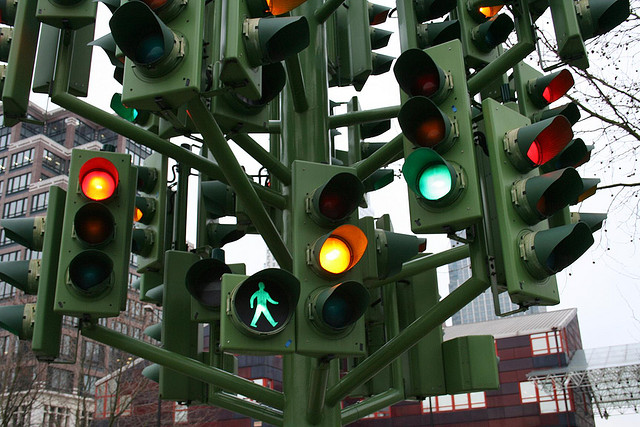
A friend of mine shared an excellent essay with me on ways to understand consent. Everyone is pretty familiar with “No means no” (even if the applications of sometimes remind me of what law school friends have sometimes told me about police executing unwarranted searches — in one case, asking if they could search, removing the resident from the premises when he said no and cuffing him, and then asking the open door of the house, not hearing an objection, and walking in). Still, it feels like more of the writing and discussion I see is about when to go on — is non-objection a yes, is only enthusiastic consent meaningful consent, etc.
In an post titled “Under Duress: Agency, Power and Consent, Part Two: “Yes”” the blogger at A Radical TransFeminist has laid out one of the best, short idea on how to parse consent that I’ve seen; one I’d recommend to my friends as a guide for behavior. I’m only excerpting the takeaway of the blogger’s point here, but the post includes a lot of thoughtful writing on all the (legitimate) constraints this approach is trying to satisfy.
I suggest a non-binary power model of consent, under which we understand the word “yes” to mean:
I choose to say “yes”, understanding the consequences of saying “no”.
The word ‘choice’ here is not used in a liberal sense and does not imply a free choice; the more punitive the potential consequences of a “no”, the less free the “yes”.
The keen-eyed will see that this is actually not a model of consent. It is in fact a model we can use to comprehend the meaning of consent acts such as “yes”, when made under multiple systems of domination.
Nonetheless, it embraces both the “my yes means yes” of agency feminism and the “yes means maybe means no” of radical feminism. From within the experience of a person asked for consent, we can understand “yes” as the best possible choice in their situation given the possible consequences of a “no”. From outside the experience of the person asked for consent – for example, as a person asking for consent in good faith, or as a bystander – we can understand that the strength of the relationship of this “yes” to a genuine “yes” is in inverse proportion to the severity of the anticipated consequences of a “no”.
This still doesn’t give what some folks seem to want — the equivalence of a whitelist-test for when it’s kosher to have sex, in the way that “no” works as a blacklist, but I don’t think such a thing exists, especially not in the abstract, as opposed to as discussed with a specific partner.
But it gives a general heuristic for how to move your encounters in the direction of the ethical — make saying “no” easy and as close to costless as you can.
For a fictional example: in the Glee episode “The Power of Madonna,” Emma (an adult) is a woman who has never had sex and has OCD that interferes with her day to day life. She and Will (her boyfriend or fiancé at this point, I don’t remember) are preparing to try out sex, and, when the escalation is uncomfortable for her and she says no, Will respects her no–doesn’t push the encounter–but also immediately totally disengages from her, moving away from her, not touching her affectionately again, etc.
This changes the consequences of Emma saying “No.”
There isn’t a way for her to pause things with Will and continue being physically affectionate for him at the level she’s comfortable with if a “no” to an escalation functions for him as an emergency eject from the whole encounter. If she could, she might be tempted to grit her teeth and see what she could handle, in order to “not ruin everything again.”
Will, in making her feel this way, certainly isn’t doing anything he’d be criminally liable for, and my best guess is that he’s not intended to be read as deliberately manipulative, let alone malicious. (Glee’s characters tend to be self-centered, short-sighted, and thoughtless, in order to propel plots, conflicts, and cathartic ballads).
If he thought the whole thing out, Will probably does genuinely prefer that Emma feel more comfortable communicating with him, so that she doesn’t aggravate her anxieties and so that he’s not in a position where he trusted a reluctant “Yes” and wound up upsetting her without meaning to. But he (and the show’s writers!) don’t have the habit of asking “What are the consequences of Emma saying ‘No?'”
Back to the non-fictional world: an inattention to the consequences of saying “No” was at the heart of discomfort about Elevatorgate (the blogo-brouhaha about atheist blogger Rebecca Watson singling out (anonymously) the man who hung out with her and then propositioned her in an elevator at a conference as an example of behavior that discouraged female engagement with the movement). Waiting to make your move in an elevator late at night, rather than in the hotel lobby/bar where you’d been talking is raising the possible consequences of a “No” since it’s riskier alone, with no exits than it would be in a semi-public place.
The offending guy here is like Will — it’s totally plausible that his actions were neither deliberately manipulative nor malicious, that he wanted as private as possible a place because he felt shy, or that he didn’t get up the gumption to ask until the last possible moment (helped by the pressure of a deadline). But, like most people, he may have been thinking mostly about how to make the ask as easy as possible for himself, rather than the pressure he’d place on the askee.

Once you’re thinking in terms of lessening the consequences of no for the person you’re hoping says yes, you can do some generally useful things (ask people out in public spaces, don’t tell (or have!) a lot of “but the bitch was crazy” stories, adapt middle school strategies of indirection, etc), but I have one more to add — ask out people you know well enough to know something non-generic about the consequences of their “no.”
The more generic the path to your hookup (take club dancing->sex as one end of the spectrum) and the less you know about your partner, the more liable you are to not have a good sense of “the consequences of ‘no'” and the more limited your ability to parse a “Yes” will be. And, meanwhile, for your partner, the less they know about you, the more uncertain they will be about what exactly the consequences of saying no will be.
The less two partners know about each other, the easier it is for someone to be hurt or feel they’ve been offered a Hobson’s choice as the result of negligence and carelessness.












